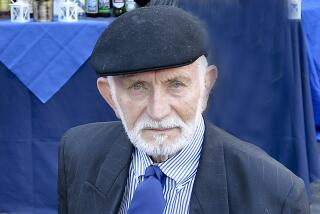Modest pioneer of long-distance running
- Share via
Ted Corbitt, a distance runner who introduced ultramarathon races to the United States and was a quiet, inspirational force in his sport for decades, has died. He was 88.
Corbitt died of respiratory failure Dec. 12 at a Houston hospital. He also had prostate and colon cancer.
A resident of New York, Corbitt competed in the marathon in the 1952 Olympic Games but made his greatest mark by organizing running groups, pioneering the ultramarathon and developing accurate methods of measuring long-distance races.
As one of the few elite African American distance runners of his time, Corbitt encountered discrimination on the track and off, but he forged ahead with a stoic determination that earned the respect of generations of runners.
While supporting himself as a physical therapist, he spent much of his time in training, often running as many as 200 miles a week.
He worked with many running groups, including the organization behind the New York City Marathon. After helping design the course for the inaugural New York event in 1970, Corbitt, then 51, finished fifth in the race. His time of 2 hours, 44 minutes and 15 seconds was seven minutes faster than his mark in the Olympics 18 years earlier.
“He’s sort of the grandfather of our sport,” Bill Rodgers, a four-time winner of the New York and Boston marathons, said in a telephone interview. “He kicked off the modern running boom in America.”
In 1959, Corbitt organized the country’s first ultramarathon, a 30-mile race through New York and its suburbs that pushed beyond the marathon’s 26-mile, 385-yard limit. (Similar races had been run in Europe since Victorian times.)
Corbitt won that 1959 race and went on to compete in 50- and 100-mile runs, as well as grueling events in which he ran for 24 hours without stopping.
During his career, he competed in 199 marathon or ultramarathon races.
The New York Times called him “the patron saint of the ultramarathon in America.”
Although he was not a coach and seldom appeared in the media, Corbitt helped popularize his sport as president of the Road Runners Club of America, which he helped found in 1958, and the New York Road Runners Club.
In the 1960s, he was at the forefront of the important but tedious task of accurately measuring the distances of running routes. He helped develop a technique that employed a calibrated bicycle wheel with a counter that recorded each revolution of the wheel.
“Long-distance runners have to be very strange people,” Corbitt once said of his lonely passion. “You have to really want to do it. You don’t have to win or beat someone, you just have to get through the thing. That’s the sense of victory. The sense of self-worth.”
Corbitt was born in Dunbarton, S.C., on Jan. 31, 1919. He was a track star at the University of Cincinnati, where he received a bachelor’s degree.
Because he was African American, he was sometimes not allowed to compete in meets in the South and Midwest.
He served in the Army during World War II and received a master’s degree in physical therapy at New York University in 1950. He spent many years as chief physical therapist at the International Center for the Disabled in New York and taught physical therapy at Columbia University and NYU.
He often ran to his office from his home, sometimes completing the 31-mile circuit around the island of Manhattan on the way. He estimated that he had been stopped more than 200 times by police, who were not accustomed to seeing a black man running through the streets of New York.
Corbitt lamented his poor showing in the 1952 Olympics, when he finished 44th in the marathon, but he went on to hold the U.S. records for the 25-, 40- and 50-mile runs.
More to Read
Go beyond the scoreboard
Get the latest on L.A.'s teams in the daily Sports Report newsletter.
You may occasionally receive promotional content from the Los Angeles Times.










